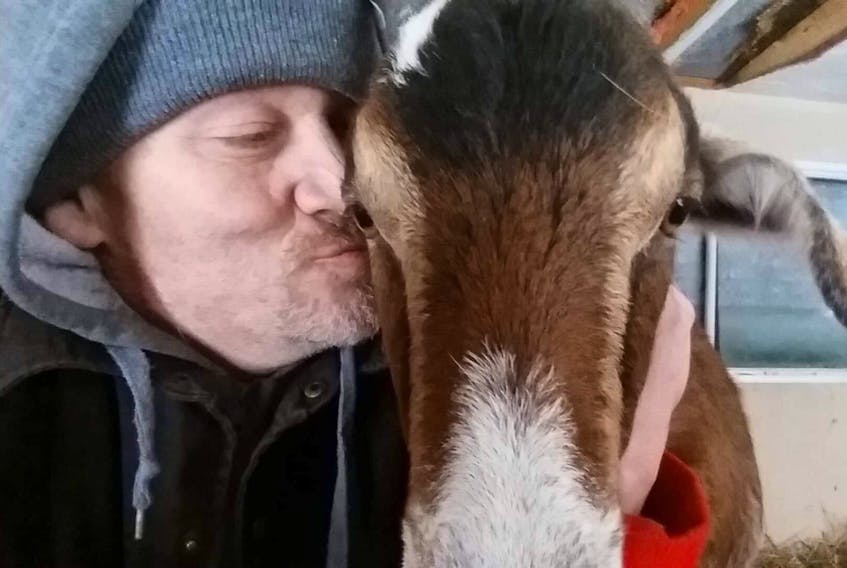DORCHESTER, N.B. — The trio of goats that have become like family to Bill Steele are heading to a new home.
Steele, owner of the Dorchester jail-turned-Airbnb, said he was “shocked and saddened” to learn of the court ruling this week, ordering him to remove his three goats from his property.
But Steele says he is able to hold on to a little comfort in knowing his pets aren’t going far – they’ll be so close by, in fact, he’ll still be able to visit them every day.
“I’m going to comply with the order and it looks like the goats are moving a few houses down,” he said.
In his ruling released earlier this week, Court of Queens Bench Justice Robert Dysart declared that Steele was in violation of the village’s zoning bylaw, which states that owning farm animals is an agricultural activity not permitted in the village centre zone, and he must immediately remove the goats and a chicken from his property.

“I do not accept that the animals are protected by virtue of the Human Rights Act, nor do I accept that they are emotional support animals,” the judge wrote in his ruling.
Steele said he was extremely disappointed in the judge’s decision to not recognize the goats he owned were not in his care as farm animals or as simple pets.
“I strongly disagree with them not being my emotional support animals,” said Steele. “I’m offended my disability was discounted by the village and they simply felt I shouldn’t have my goats with me. I’m hurt, saddened, and feel my rights have been violated by the village.”
Rhea, Princess and Deputy have been at the centre of a legal dispute since last summer, when Steele first began housing the goats along with several chickens. A couple of weeks after he had acquired the animals, Steele received notice from the local planning commission and the village, ordering him to remove the goats from his property.
The SERSC letter advised Steele he had a month to find alternative accommodations for his goats, either outside the village centre zone on a property that has an existing agricultural operation or outside village limits. After he refused to give them up, however, the village then pursued legal action against him.
The case went to trial just this past September, after several delays held it up from its initial May start date.
Along with the order to remove his goats, the village also wanted the judge to ban Steele from ever owning animals, not in keeping with the bylaws, while he lived on that property. Dysart denied that request, saying there are bylaws are in place for these situations and if a similar issue arises again, it can be brought back to court.
The village was also seeking all of its legal costs to be paid by Steele.
The judge instead ordered Steele to pay $1,000, saying while he agreed Steele’s behavior was, at times, “rude and unnecessarily confrontational,” he also recognized this was a deeply personal issue for him and that perhaps he had allowed his emotions to get the better of him.
Steele said he does not plan to file an appeal in this case, despite being distraught over having to give up his goats.
“I could fight it, appeal it, but it’s making everyone money except me. And I don’t want to contribute to that stuff at this point in my life.”
Instead, he is trying to find the positive in a bad situation, content knowing for now that the goats are staying in Dorchester on a property close by, one that permits agricultural operations. He said he is grateful to the property owner, who is from Ontario like himself, as well as the other offers of assistance he has had since the court ruling was announced.
“I’m blessed no matter what. I’m alive and healthy and still trying to recover from my son’s passing,” he said. “I’m going to turn this into something positive.”
Steele moved to Dorchester in early 2017 after his adult son died after heart issues. Steele, now suffering from severe depression, said he and his son had always talked about moving away from Toronto and raising goats – that’s why they provided him such comfort.
He did point out that there is still an outstanding human rights complaint that has been filed against the village, which he says has just been moved to an official investigation by the province.
“I expect a lot to come out of the investigation by the Human Rights board of NB. I’m happy they are investigating this.”
Village officials are remaining quiet on the judge’s ruling, other than issuing the following statement from Mayor Jerome Bear on Friday: “The village of Dorchester Council fulfilled their duty as elected officials in upholding the by-law and the decision speaks for itself.”
RELATED:
Popular Airbnb in Dorchester shut down temporarily
Goat dispute in Dorchester heading to court









